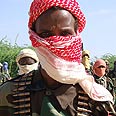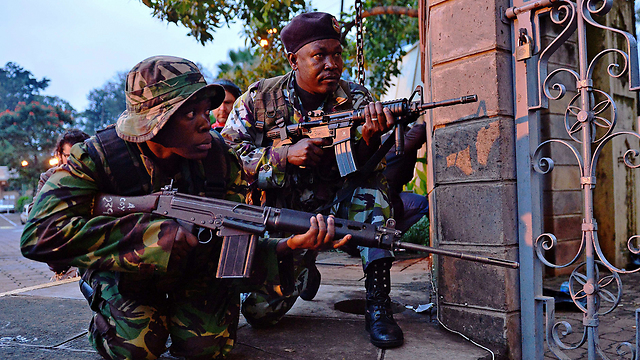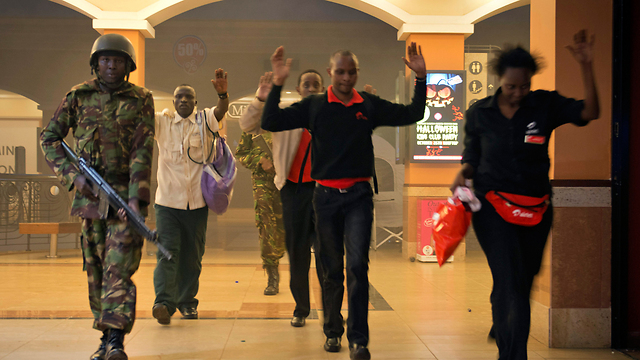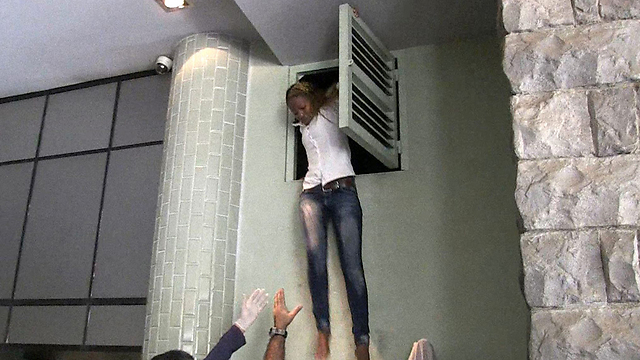
Dozens dead at Kenyan mall
Multiple large blasts rock Kenya's Westgate Mall where a hostage siege is in its third day. Security forces try to rescue unknown number of hostages. Israeli experts advise to isolate terrorists, understand their demands
Occasional gunfire rang out on Monday from the Nairobi mall where militants from Somalia's al Qaeda-linked al Shabaab group threatened to kill hostages on the third day of a raid in which at least 59 have already died. Earlier, the Red Cross was quoted as having said at least 69 were dead, the AFP reported.
Kenya interior minister says two male militants killed Monday after military operation at mall. Reuters journalists near the upmarket Westgate complex heard sporadic shots as well as heavy bursts of rifle fire and muffled blasts on at least two occasions in the morning. Kenyan troops moved around outside the building. A Kenyan Red Cross official, Abbas Gullet, said there had been clashes inside the building.
Related stories:
- Kenyan forces say they rescued 'most' hostages
- Minister: Death toll in Islamist attack on Kenyan mall up to 59
- Gunmen storm Nairobi Mall, dozens killed
The Gunmen involved in the attack came from several countries, a senior Kenyan security official said on Monday, without revealing what those nations were."We have an idea who they are, their nationality and even the number," said Julius Karangi, Kenya's chief of general staff, adding that militants were "clearly a multinational collection from all over the world."
"We have also have an idea that this is not a local event. We are fighting global terrorism here and we have sufficient intel (intelligence) to suggest that," he said.
But there was no indication of the fate of people whom the authorities had said on Sunday were being held by 10 to 15 gunmen - and possibly women. Nor was it clear where they were.
A senior officer said police were "closing in" on the militants after rescuing more trapped people overnight. But officials have been suggesting since Sunday that the siege may be near an end, while the guerrillas seemingly remain at large.
Interior Minister Joseph Ole Lenku said "a few" people were still hostage: "Our disciplined forces ... have been extremely careful to find the balance between neutralising the attackers and getting as many people to safety as possible," he added.
A spokesman for al Shabaab, which has demanded Kenya pull its troops out of neighbouring Somalia, warned they would kill hostages if Kenyan security forces, who are being assisted by Western and Israeli experts, tried to storm their positions:
"Israelis and Kenyan forces have tried to enter Westgate by force but they could not," Sheikh Ali Mohamud Rage said in an audio statement posted online. "The mujahideen will kill the hostages if the enemies use force."
On Twitter, the group posted: "As the operation gathers momentum inside #Westgate, the Mujahideen are for the 3rd day still in full control of the situation on the ground."
The Red Cross said on Monday that the death toll since Saturday's initial lunchtime bloodbath stood at 69. But Interior Minister Lenku said that was wrong and that only 59 were dead.
The Red Cross also said it had also recorded 63 people being reported by relatives as missing.
Survivors' tales of the military-style assault by squads of attackers hurling grenades and spraying automatic fire, has left little doubt the hostage-takers are willing to kill. Previous raids around the world, including at a desert gas plan in Algeria nine months ago, suggest they are also ready to die.
The Kenya mall attack claimed the lives of several foreign citizens from the US, Britain, France, Holland, Canada, China, and Ghana. The president's nephew and the nephew's fiancée died in the attack. Three Israeli citizens were rescued from the mall, one of whom memorized a Muslim prayer following rumors saying terrorists let all Muslims go.
The al-Qaeda linked organization Al-Shabab, which took responsibility for the attack, said it would not negotiate with the Kenyan government.
President Shimon Peres, in a Sunday letter to Kenyatta, said, "I wish to extend my deepest condolences to the people of Kenya on the horrific terror attack in Nairobi… We in Israel know the pain of terror and will do whatever we can to support the people of Kenya.”
Yaki Lopez, Deputy to Israeli Ambassador to Kenya, told Ynet Monday that gaining full control on the structure is still beyond reach. "We are in the field, trying to see how we can help, giving support," he said.
"The threat of terror affects us too, which is why we make an effort to monitor these issues up close and see where we can help."
The envoy added that "ties between Israel and Kenya have been close for many years… in various issues, including security issues. As early as in Operation Entebbe, the Kenyans were helping Israel greatly."
Israeli expertise
According to foreign reports, a team of Israeli negotiators is at the scene of the attack in Kenya; however no Israeli fighters are taking part in the operation itself.
Security experts who spoke to Ynet gave their take on how to neutralize the terror attack in the Kenyan capital, recommending the isolation of the attackers and understanding their demands, while using Israeli experience.
Knesset Member David Tzur (Hatnua), former head of the Yamam (Israeli SWAT), said that "there is an exchange of knowledge and joint training, but (Israeli) fighters never actually take part in the operation itself. In this case, it is very possible there are official advisers (in Kenya), who come from civilian companies. Agreements are signed between the Israeli Public Security Ministry and foreign Public Security Ministries, there is an exchange of information and intelligence, and they are interested in fighting terrorism, an issue we have much knowledge and experience in."
According to him, "the interest is mainly due to political ties and relations between the countries. Israel has a history of relations with Kenya, and there is also an interest in cooperation on an economic level."
Col. (res.) Lior Lotan, head of the International Institute for Counter-Terrorism (ICT) at Herzliya's Interdisciplinary Center (IDC) and former head of the IDF's negotiation team said that "the responsibility and authority to make decisions lies always with the local forces. Israeli aid forces can only try and solve local issues based on their experience or design a plan in a specific field."
Lotan added that "you cannot place a product from our world in a different culture, but in Kenya we have kidnappers who are members of an al-Qaeda-affiliated terror organization. The principles of the global jihad are well-known to those who fight it, and thus the common language exists – the motives, the strategy, and more. This allows an optimal dialogue in Kenya."
In terms of operating in the field, Tzur explained that "the most important thing is to isolate the terrorists and hostages in a manner that the entire scene will be 'cleaned out' and allow minimizing damage. The aim should be to calm down, try to reach common grounds and understand what the demands are. Usually in these events, the demands start high and as matters of principle, and eventually reach the ground and become concrete."
Attila Somfalvi contributed to this report
- Receive Ynetnews updates directly to your desktop













